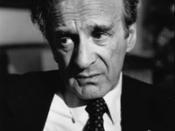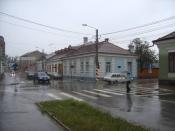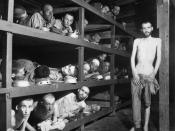By: Lee A. Zito
Death is an experience that I hardly think about. Whether it concerns my family, friends, or myself, death is something in which I have ultimately no thought of in my day to day life. For Elie Wiesel, during his stay in a Nazi Concentration Camp, death was everywhere. Death was upon his family, friends, and lingered heavily upon him throughout his time spent as a prisoner at various concentration camps. In his world death was reality, death was everyday life. Death was even in the air as crematoriums burned the dead up into ashes. What I found so profoundly amazing within Wiesel's book, Night, was the realness of something as a fortunate young adult I have never had to consider. That is death.
As a teenager during the early 1940's in Sighet, Romania, Eliezer had a firm belief in God. He yearned to study mysticism in his Jewish religion and deepen his knowledge of the Holy Books despite his father's constant reminder that he was still to young and that there was no one in Sighet to teach him the Cabbala.
Frustrated and desperate for a teacher, Eliezer meets Moshe the Beadle. Moshe asks Eliezer thought provoking questions and intends to help him deepen his knowledge of his religion. But this does not last, soon Moshe is deported with others to a concentration camp where he is shot in the leg and taken for dead. With tremendous luck he escapes from the Germans and returns to Sighet to warn the Jews. No one believes him, not even Eliezer, but soon enough Moshe's prophecy has come true. The Jews of Sighet are put into Ghettos where they await uncertainty, but if they have to await uncertainty, they do it with optimism.
Their optimism fails them and...



Night
Your essay is more of a summary than an analysis. There are a number of other elements which you began to analyse and simply dropped. All in all it was a good attempt.
P.S - You make a strong statement by saying that "that is what the author wanted ..." to add validity you MUST back it up with outside sources
2 out of 2 people found this comment useful.